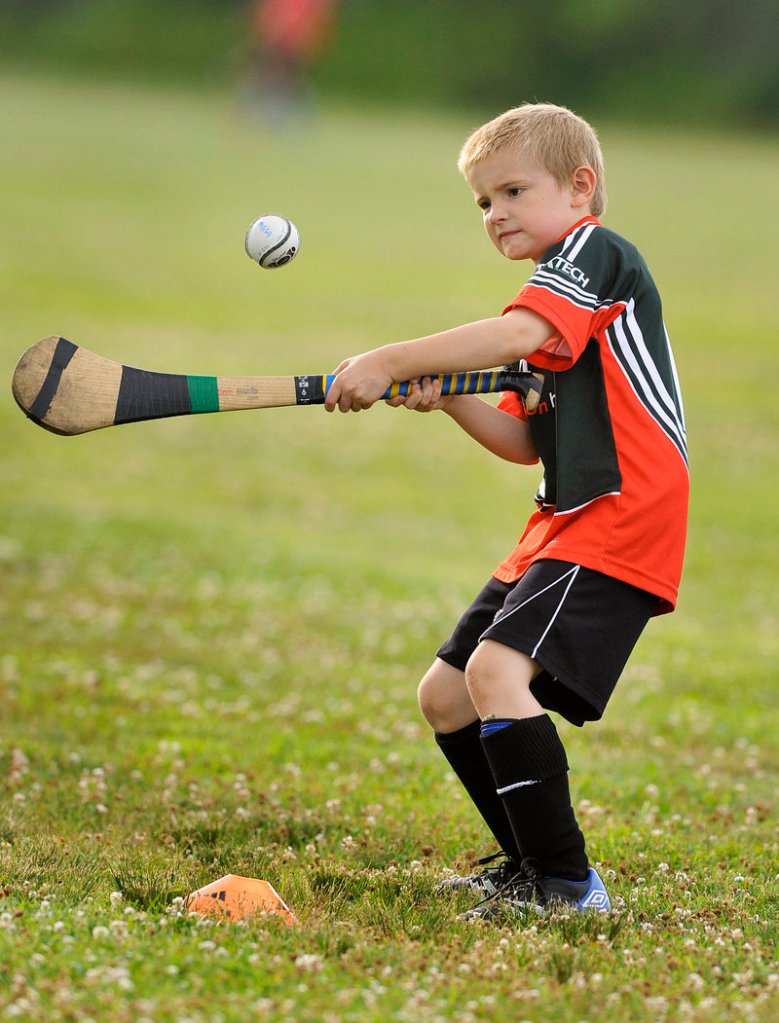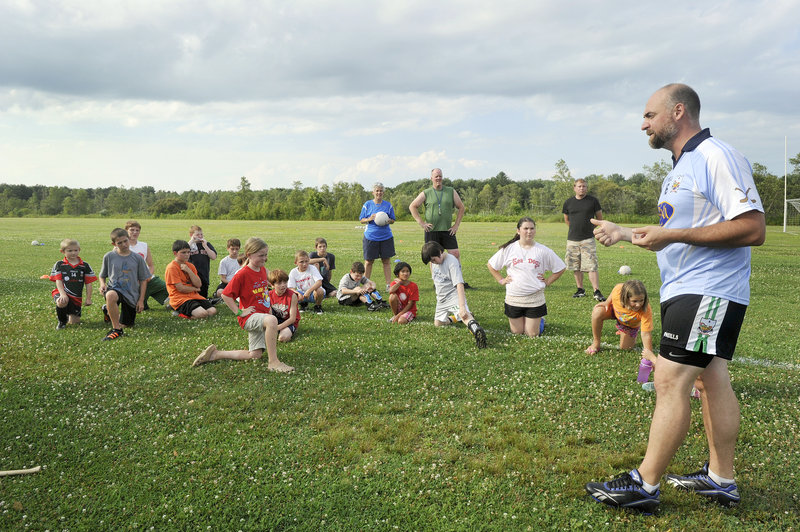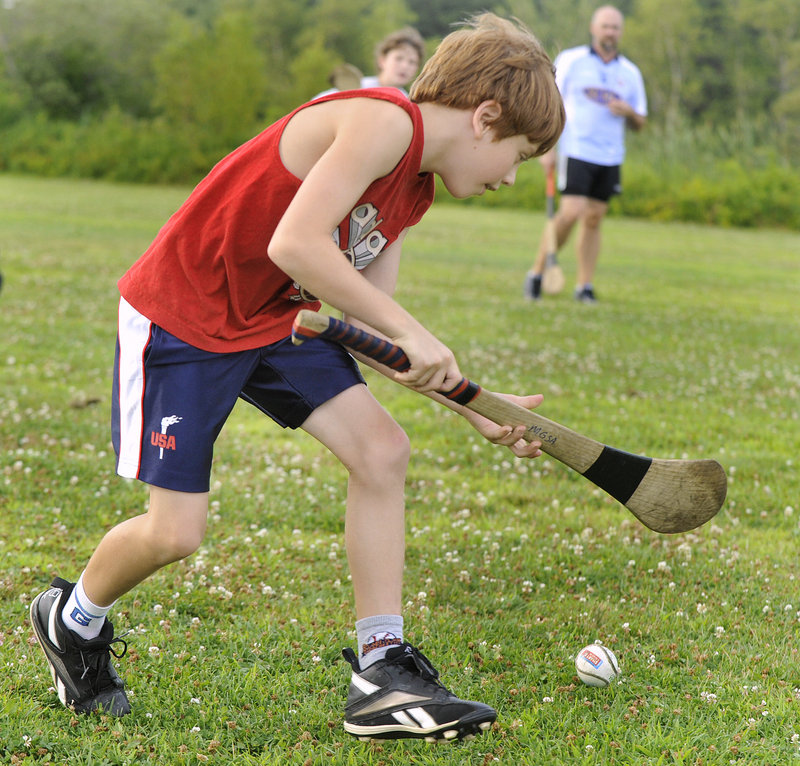SOUTH PORTLAND – On a distant patch of clover far from the parking lot at the Wainwright Athletic Complex, Gracie Johnston of South Portland is teaching her 8-year-old daughter Bonny to wield an ax.
Well, no. That’s not quite right. Bonny is wielding an ax-shaped wooden club called a hurl (or hurley) and she’s learning, along with more than a dozen other kids, to hit a ball called a sliotar.
“I just think it’s a great all-around sport,” said Johnston of the sport known as Irish hurling. “It’s fast-paced, the kids have fun and all ages can do it.”
Johnson played basketball and softball at Gordon College and, after some training, has become a coach of both hurling and Gaelic football. In both sports, she can see elements of volleyball, basketball, soccer, lacrosse, hockey and baseball.
Her 12-year-old son, Khem, took up hurling last year at the urging of a friend and loves it, even though he suffered a broken leg at a tournament in Massachusetts last year.
“He got hit with the hurl and down he went,” Johnston said. “But he wanted to play again.”
Youngsters from all over southern Maine will have a chance to try hurling — and Gaelic football — Saturday when the Maine Gaelic Sports Alliance hosts a Summer Blitz at the Wainwright complex. A clinic kicks things off at noon and is followed by a series of friendly games from 1 to 4 p.m., followed by a cookout at Crescent Beach State Park, weather permitting.
“You have to come to the clinic in order to be able to play,” said John Hartley of South Portland, one of the coaches. “We’ve had them as young as 6 and as old as 14.”
Hartley has a 9-year-old daughter who plays. He’s also a member of the adult hurling pub league, now in its fifth year (portlandhurling.com) and boasting four teams along with a travel squad that plays in tournaments.
This is the second year of youth hurling in Maine and the development director, James Tierney, has been reaching out to recreation departments in South Portland, Westbrook, Pownal and Freeport to provide more exposure and instruction in what he calls “the fastest game on grass.”
Each Wednesday night in the summer, the kids gather on a field at Wainwright adjacent to a pub league game. They do drills, hone skills and scrimmage.
Tierney said the biggest growth area for Gaelic sports is with children under 10.
“That has basically tripled in size,” he said. “As the kids get older, they start focusing on two or three sports.”
Tierney’s children have recruited many of their buddies to hurling. That’s how Jack Vose-Gimbel, 12, of South Portland discovered the sport.
“I was kind of confused what it was and how to play it,” Vose-Gimbel said. “I like other sports better but this is pretty fun to play.”
Points are scored in hurling by whacking the ball between opposing goal posts, either over a crossbar (for one point) or under the bar and into a net (for three points).
Unlike a baseball or softball hitter, hurlers use a cross-handed grip before taking a swing at the ball.
“For some of the little kids it’s more difficult because they don’t have as much strength,” said Gracie Johnston. “But it’s not tough for them to pick up the game.”
Conall Matthews, 7, seems to be holding his own among kids two and three years older. He started playing this spring after seeing hurlers marching in the St. Patrick’s Day parade in Portland.
“He saw this and he fell in love,” said his mom, Kara Smith, of Windham, as she sat by the sideline at Wainwright during a recent practice. “He can’t wait to come here every Wednesday. That’s all him and his dad do at home.”
The hotbed of hurling in New England remains the Boston area, with its abundance of Irish expatriates. Teams from three Massachusetts cities are expected to attend Saturday’s Blitz.
“The goal is to have at least three towns (in Maine) — and hopefully four — playing against each other next year,” Tierney said.
“In other words, providing local games without kids having to travel to Massachusetts, or have Massachusetts teams come up here, to get consistent competition.”
Doug McIntire, who travels from Auburn each week to help coach the youthful hurlers, said entire villages in Ireland used to compete against each other and the scores sometimes reached into the hundreds for each side.
“Historically it dates back about 3,000 years,” McIntire said. “It’s Ireland’s national sport.”
Staff Writer Glenn Jordan can be contacted at 791-6425 or at:
gjordan@pressherald.com
Twitter: GlennJordanPPH
Send questions/comments to the editors.






Success. Please wait for the page to reload. If the page does not reload within 5 seconds, please refresh the page.
Enter your email and password to access comments.
Hi, to comment on stories you must . This profile is in addition to your subscription and website login.
Already have a commenting profile? .
Invalid username/password.
Please check your email to confirm and complete your registration.
Only subscribers are eligible to post comments. Please subscribe or login first for digital access. Here’s why.
Use the form below to reset your password. When you've submitted your account email, we will send an email with a reset code.